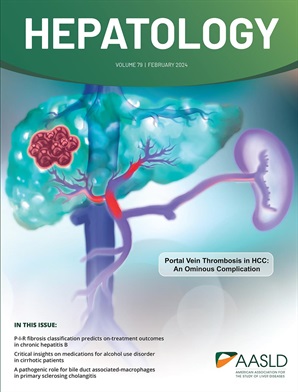Integrative hepatology: Enhancing overall health to manage liver disease.
IF 15.8
1区 医学
Q1 GASTROENTEROLOGY & HEPATOLOGY
引用次数: 0
Abstract
Despite remarkable advances in diagnostics, pharmacotherapy, and transplantation, conventional hepatology often falls short in addressing the persistent symptoms, impaired quality of life, and broader health needs of people living with chronic liver disease. Integrative Hepatology-rooted in the principles of integrative medicine-offers a holistic, evidence-informed approach that combines conventional hepatology with complementary modalities to address the biological, nutritional, physical, psychosocial, behavioral, and environmental determinants of liver health. This framework emphasizes multimodal, patient-centered care aimed at improving both liver-specific and overall health outcomes. We outline three models for implementation: (1) foundational knowledge for all hepatologists, incorporating core skills in nutrition, physical activity, and mind-body practices; (2) collaborative referral networks to integrative health providers; and (3) specialized hepatologists with advanced training in integrative medicine. Examples of application to fatigue, cramps, falls, and mental health in chronic liver disease illustrate the potential for non-pharmacologic and complementary strategies to enhance patient well-being. Implementation faces challenges, including evidence gaps, limited training, time constraints, reimbursement barriers, and inequitable access, but opportunities exist through education, interdisciplinary collaboration, group medical visits, and digital health delivery. By expanding the scope of liver care to include whole-person health, Integrative Hepatology seeks not to replace established therapies but to augment their impact-supporting patients in achieving optimal health across the disease spectrum.综合肝病学:加强整体健康以管理肝脏疾病。
尽管在诊断、药物治疗和移植方面取得了显著进展,但传统肝病学在解决慢性肝病患者的持续症状、生活质量受损和更广泛的健康需求方面往往存在不足。综合肝病学——植根于综合医学的原则——提供了一种全面的、循证的方法,将传统肝病学与补充模式相结合,以解决肝脏健康的生物学、营养、生理、社会心理、行为和环境决定因素。该框架强调多模式、以患者为中心的护理,旨在改善肝脏特异性和整体健康结果。我们概述了三种实施模式:(1)所有肝病学家的基础知识,包括营养,身体活动和身心练习的核心技能;(2)综合卫生服务提供者协作转诊网络;(3)接受过中西医结合高级培训的肝病专家。应用于慢性肝病的疲劳、痉挛、跌倒和精神健康的例子说明了非药物和补充策略增强患者健康的潜力。实施面临挑战,包括证据差距、培训有限、时间限制、报销障碍和不公平获取,但通过教育、跨学科合作、团体医疗访问和数字卫生服务存在机会。通过将肝脏护理的范围扩大到包括整个人的健康,综合肝病学寻求的不是取代现有的治疗方法,而是增强其影响,支持患者在整个疾病谱系中实现最佳健康。
本文章由计算机程序翻译,如有差异,请以英文原文为准。
求助全文
约1分钟内获得全文
求助全文
来源期刊

Hepatology
医学-胃肠肝病学
CiteScore
27.50
自引率
3.70%
发文量
609
审稿时长
1 months
期刊介绍:
HEPATOLOGY is recognized as the leading publication in the field of liver disease. It features original, peer-reviewed articles covering various aspects of liver structure, function, and disease. The journal's distinguished Editorial Board carefully selects the best articles each month, focusing on topics including immunology, chronic hepatitis, viral hepatitis, cirrhosis, genetic and metabolic liver diseases, liver cancer, and drug metabolism.
 求助内容:
求助内容: 应助结果提醒方式:
应助结果提醒方式:


